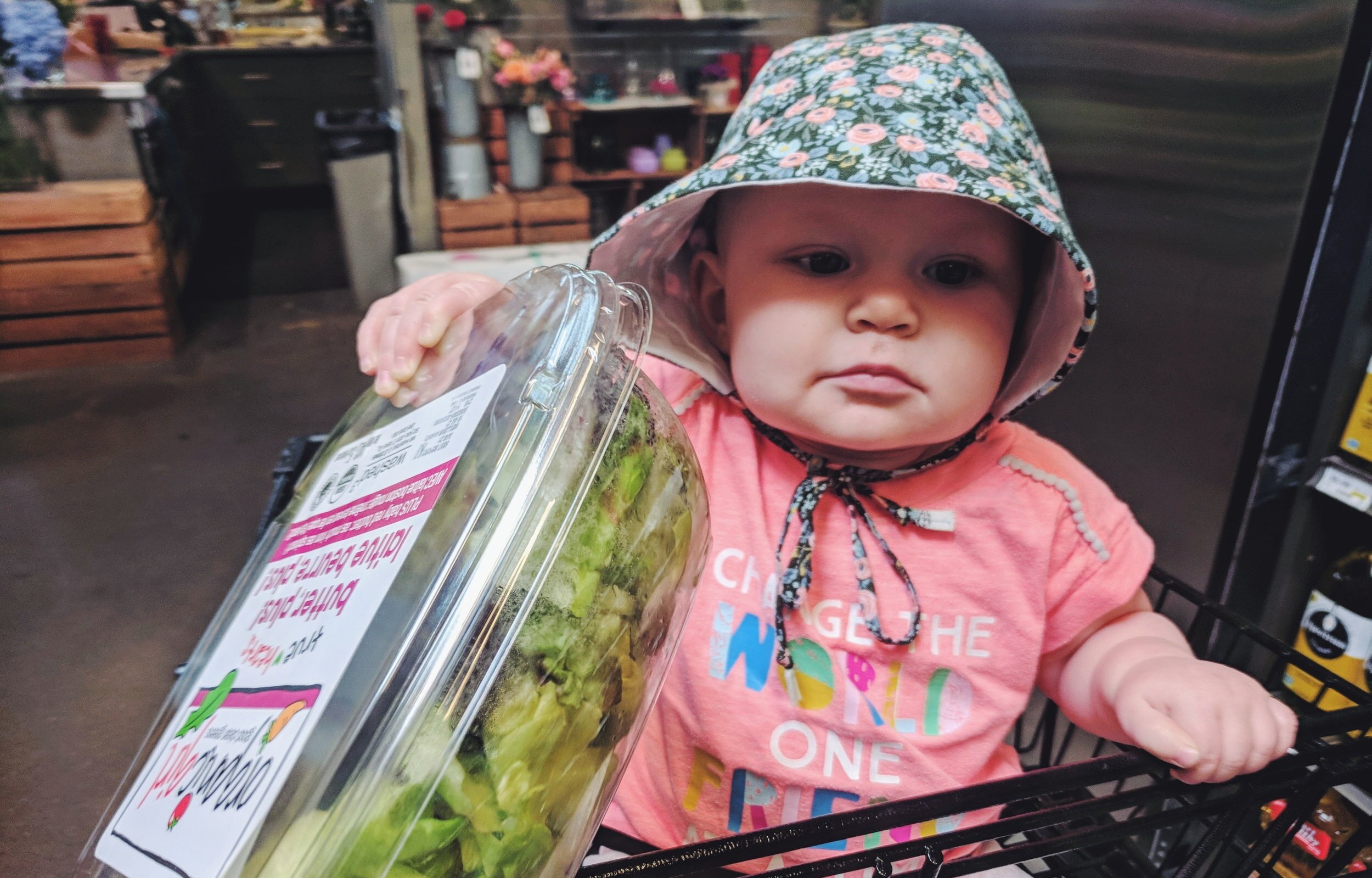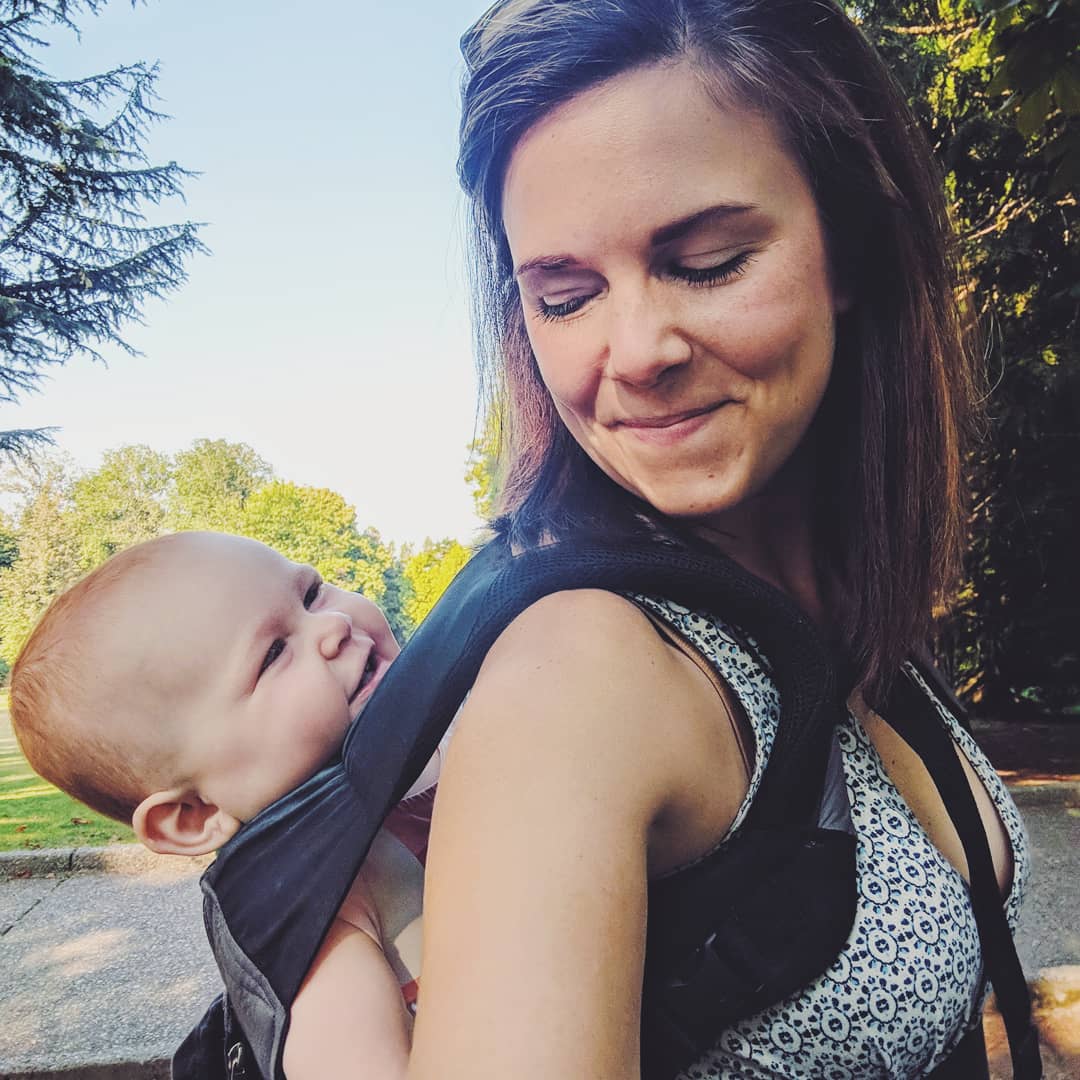A Respectful Intro to Toddlerhood
Montessori in Real Life
Despite my wishes for D to stay a baby forever, she has other plans in mind. The toddler is emerging. It turns out you can have toddler 'tude without toddler steps. ;) The most recent "tricky" toddler behaviors we've been seeing are: throwing food off the table, pinching or hitting us, tantrums when something isn't available (like our dog's water bowl), or not getting what she wants (like being picked up right away).
Unsurprisingly, I've found that the easiest and best way to deal with difficult behaviors is to prevent them from happening in the first place. Providing a predictable schedule, making sure she's slept enough, eating frequently and nutritiously, and giving her plenty of one-on-one time to help her overall happiness. I also find she gets less frustrated when we have child-proofed our home while making it accessible for her, meaning minimal dangers or off-limits. The also means we don’t have to say no to her more often than necessary, as the more toddlers hear the word no, the more they say it right back. ;)
D is also more content when she is able to participate in our activities. Little things like giving her opportunities to pick out her diaper before changing, hold onto the grocery list in the shopping cart, or help unload the spoons from the dishwasher often (not always) prevent a meltdown. Limited options (just 2 at this age) also give her a small sense of autonomy which can be really helpful for both of us. Examples: "Do you want to read the truck book or the color book?", "Do you want to drink your water or start with your zucchini?", "Do you want me to pick you up or crawl over to me?" At this point she can usually point or nod to indicate preferences.
Of course even if all her needs have been met and we've given her opportunities for autonomy, she is still entering toddlerhood, where emotions are high, impulse control is low, and the need to exert her will is just beginning. She is at the age where she is learning to be her own independent person, and tantrums and testing are part of the process! And after working in a classroom of toddlers, I know this is just the beginning of a wild ride. She just needs to know I love her through it all.
Most of my reading on this topic has been Janet Lansbury's respectful parenting philosophy and Positive discipline techniques we used in the Montessori classroom. No Bad Kids and Positive Discipline are both useful books if you're going this route. Based on these ideas, when D does exert her toddler will, these are some of the steps we take at home.
Remain calm. I've found this is one of the most important (but difficult) components. I have to remember not to take D's behavior personally. She is trying out behaviors with me because she trusts and loves me, and therefore feels safe to experiment. When I remember that, it's easier to stay calm and let the storm pass. We try to avoid reacting with "ow!" or "no!" unless she's in danger (or when she hurts us and it's instinctive!), because those give her the reactions she's hoping for.
If throwing/hitting/etc, stop the behavior with my hand or remove her from the unsafe situation gently. Let her feel her feels.
Acknowledge, accept, and respect her feelings and frustrations without trying to fix or distract. Keeping the wording simple seems to be best when she's worked up. We try not to focus too much attention on the negative behavior. I usually say something like "I know you really want to ______ and I couldn't let you _______ because _____. I see you are very upset/sad/frustrated about that."
Once she has (hopefully) calmed down a bit, provide comfort and offer safe/acceptable alternatives. See specific examples below.
Respectful Ways to deal with Specific Tricky Toddler Issues:
Pinching/hitting: Again, I have to remember not to take this personally, because she is simply testing and looking for reactions. Toddlers want attention, good or bad. She often pinches when she's overtired and I'm holding her. When she does, I take her hand away and hold it. I say "I won't let you pinch me because that hurts", and leave it at that as to not draw too much attention to the negative behavior. I might demonstrate a nice pat or hug. If she keeps trying to pinch/hit, I'll ignore the behavior and place her down on the floor for a minute so she can't keep going. Of course this makes her upset but she soon gets the point.
Throwing Food: This requires sitting with D throughout mealtimes. When D begins to throw food, I stop her hand and say "I can't let you throw that food. Food stays on the table." I then show her how to put her food in a different small bowl on the table, or let her hand it to me. She usually wants to throw food she doesn't want to eat, so offering an alternative place to put it can be helpful. If she throws and I don't catch it, I just try to ignore it. If she keeps trying to toss her food on the floor, it shows me she isn't that hungry so we sign "all done" and end mealtime. Additionally, we give her other throwing opportunities with balls, etc during playtime.
Tantrum over not getting to play with something: The most recent example of this is a large box fan we had in our living room. She really wanted to play with it, but it wasn't safe for her little fingers. When she started to touch it, I picked her up and took her away from it, saying "I can't let you play with the fan, it's not safe." She arched her back and squirmed and cried. I acknowledged that it made her upset when I removed her from the fan and let her be upset for a few minutes. I offered snuggles and a book. Then I showed her a couple of other toys to choose between. (I also relocated the fan so it wouldn't be an issue again. With objects that can't be removed, it might take quite a few reminders before they are able to stop trying to touch it, but it will eventually happen.)
Tantrum over wanting to be held: This is a really common one for us while I'm trying to prep food for D. I start to cook or simply put food on her plate, and she throws herself on the floor at my feet, wanting to be held or eat the food immediately. I can sometimes prevent this by wearing her on my back so she can see the food being made. Better yet, my husband is going to build her a learning tower so she can watch and participate more, which will likely help a lot. In the meantime, when she starts to melt down, I tell her I hear her frustration and I let her feel the feels and explain that I need a few more minutes to finish prepping her food. (I hurry) and when I'm ready to pick her up or give her the food, I then remind her of the signs for "help", "up", or "eat", so she can at least learn to communicate in a more effective way than screaming.
Who knows what the next phase of toddlerhood will bring! Luckily I love this one to the moon and back.
What strategies do you find helpful (or not) with the toddler 'tude?





